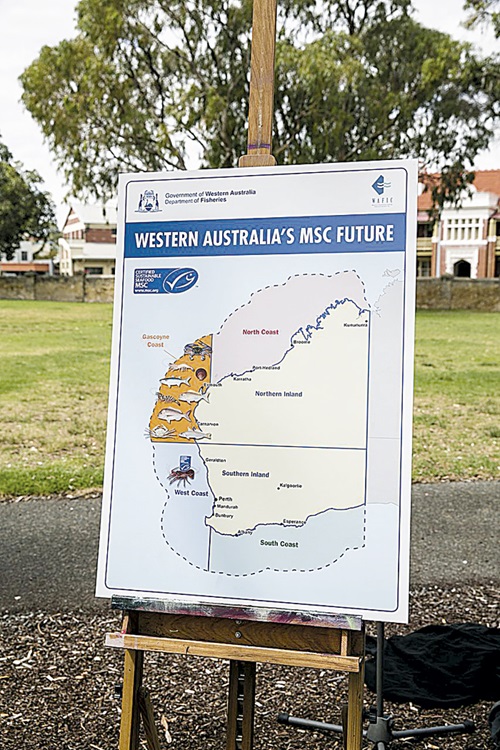By Rose Yeoman
 The map defining the four WA bioregions to be pre-assessed under MSC assessment guidelines.
The map defining the four WA bioregions to be pre-assessed under MSC assessment guidelines. Photo: Marine Stewardship Council
A pre-assessment for the first of Western Australia’s four fisheries bioregions has been completed, as the state begins the process of achieving environmental sustainability certification for its entire wild-catch seafood industry.
The WA Government, supported by the Western Australian Fishing Industry Council (WAFIC), has allocated $14.5 million over four years to assess WA’s commercial fisheries for third-party certification under Marine Stewardship Council (MSC) guidelines.
Guy Leyland, industry project leader at WAFIC, says many of the state’s 46 individual commercial fisheries in the four bioregions are multi-species and multi-gear. To assess each individually would present logistical, capacity, resourcing, procedural and policy difficulties.
The bioregional ‘pre-assessment’ approach is an innovative world first for MSC assessments. Daniel Gaughan, supervising scientist for the assessment process, says it is more pragmatic to assess all the fisheries in one region simultaneously.
“The pre-assessment process is essentially a detailed gap analysis against the MSC certification criteria. We’re rewriting how we’ve traditionally done business and the assessment will be more comprehensive because we’re using an ecosystem-based approach, which considers all fishing effects on the broader ecosystem within a region while accounting for the target stocks for each fishery,” he says.
The pre-assessment of the Gascoyne region of WA has been completed and the assessors will provide the results to the industry in the region in the near future. Pre-assessments for the North Coast are scheduled from October 2013 to February 2014, for the West Coast from December 2013 to April 2014, and for the South Coast from May to September 2014.
Guy Leyland explains that once a bioregion has been pre-assessed, individual fisheries in the area will need to decide if they wish to enter full assessment. This decision is voluntary.
“While government will pay for the costs of assessment for full MSC certification and the initial audit, fisheries will be responsible for ongoing costs. They will need to weigh up the costs and benefits of entering into the MSC program,” Guy Leyland says.
“For some fisheries, improvement programs will be required to bring them up to a point where they can be confident that they would successfully pass assessment for full MSC certification,” he says.
The full assessment process has rigorous requirements for stakeholder involvement that exceed those required during a pre-assessment.
To achieve MSC certification, fisheries are assessed against 31 performance indicators under three principles: the target stock, the ecosystem effects and the management system. Once certified, a fishery is audited annually and must be assessed for recertification every five years.
MSC certification is recognised as the ‘gold standard’, providing the world’s highest measure of fisheries sustainability and environmental performance.
Guy Leyland says WAFIC fully supports the government’s choice of the MSC as the means to provide credible assurance of the performance of WA fisheries to the community.
“One outcome will be enhanced public confidence in the sustainability of WA fisheries and greater confidence among consumers that the seafood they are purchasing is sustainably fished. It will also assure a range of stakeholders that WA’s commercial fisheries are well managed, which will help secure access to markets. This includes the opening up of new markets, encouraging business and market innovation and promoting the formation of commercial partnerships through the supply chain, as well as encouraging regional investment,” he says.
Heather Brayford, deputy director-general at the WA Department of Fisheries, describes the move to seek independent certification of all WA’s fisheries as one of the most significant reforms in the commercial fishing sector.
“Reform is driven by demand from interest groups, the retail sector and the broader community for commercial fisheries to demonstrate their sustainability credentials. Increasingly, audit and certification of fishery performance and sustainability through third-party processes are becoming features of public accountability,” she says.
“Major retail chains with seafood procurement policies – both overseas and in Australia – seek to source seafood from third-party-assessed sustainable fisheries.”
Heather Brayford says two key priorities for the industry are securing long-term fishing-access rights and the independent verification of the current governance of fisheries, which will help build community support. She says the program is groundbreaking and “will shift the way we think about, and do business in, fisheries management”.
More information
Heather Brayford, 08 9482 7370
heather.brayford@fish.wa.gov.au
Daniel Gaughan, 08 9203 0156
daniel.gaughan@fish.wa.gov.au
Guy Leyland, 08 9432 7777
gleyland@wafic.org.au





